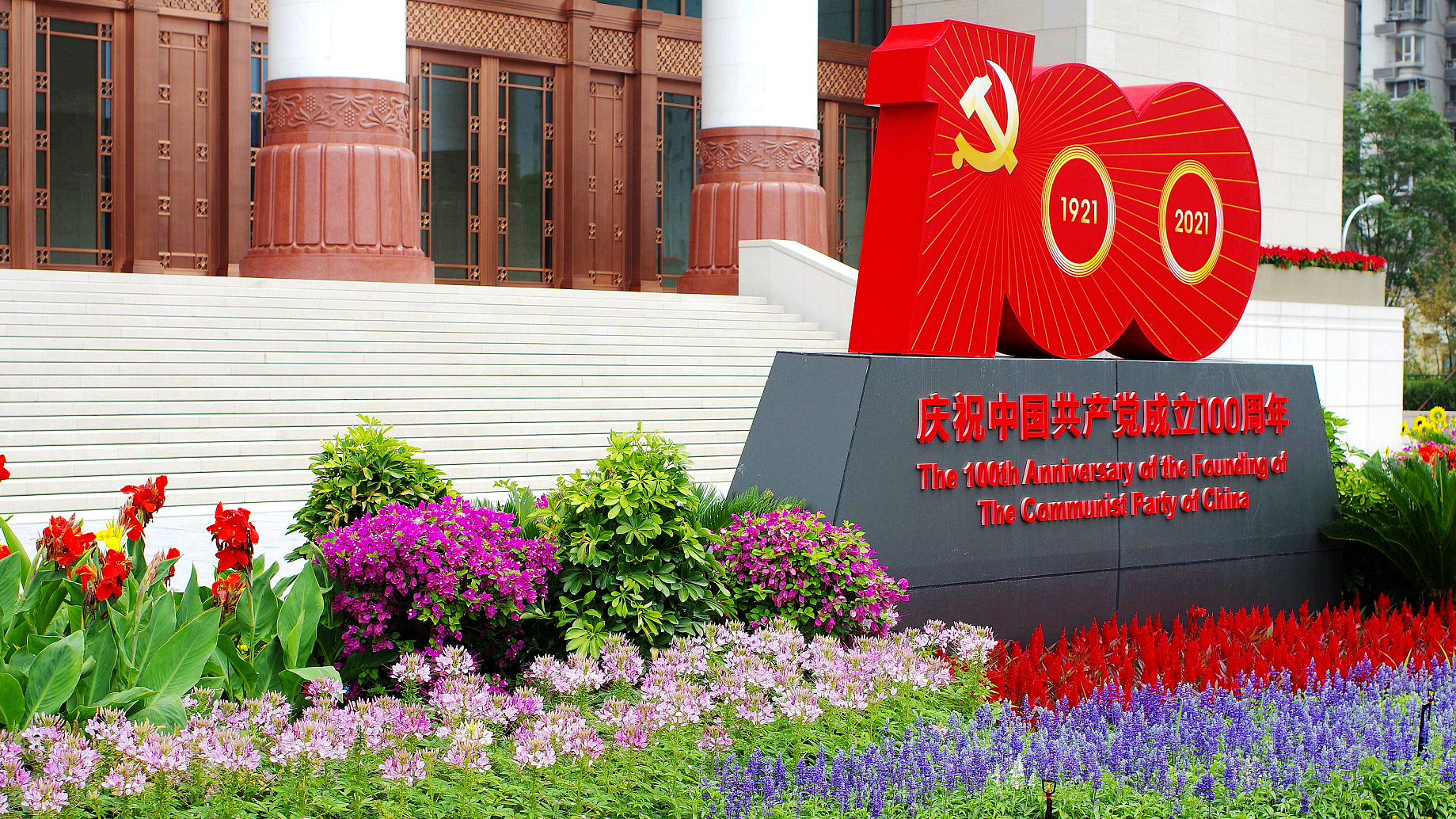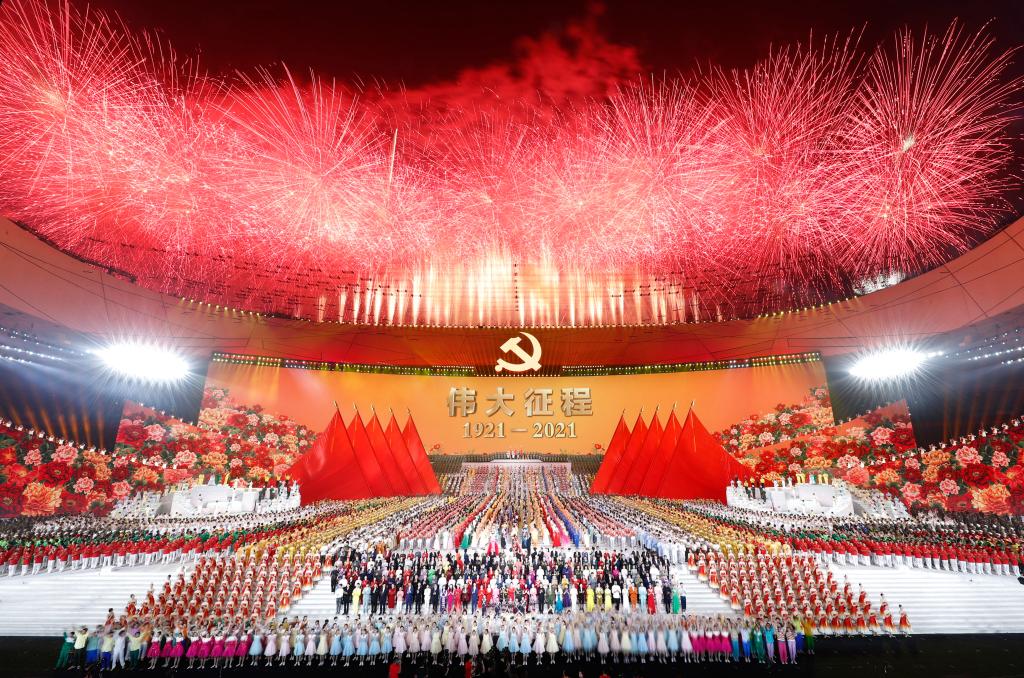
A tributary display outside the Museum of the Communist Party of China in Beijing, China, June 23, 2021. /CFP
A tributary display outside the Museum of the Communist Party of China in Beijing, China, June 23, 2021. /CFP
Editor's note: Danny Haiphong is a journalist based in the United States and activist with the No Cold War international campaign. Carlos Martinez is an author and a social activist based in Britain, and the co-founder of No Cold War . The article reflects the authors' opinions and not necessarily the views of CGTN.
Since the foundation of the People's Republic of China (PRC) in 1949, the Chinese people have experienced an unprecedented and extraordinary improvement in their living standards and the level of human development. But support for China within much of the Western left is a somewhat marginal position.
Poverty alleviation and improvement in living standards
In its 72 years of existence, the PRC has accomplished more in the realm of poverty alleviation than any nation in history. During the first three decades of socialist construction since 1949, feudalism was eliminated, comprehensive land reform was carried out, and basic medical services were set up throughout the country. However, although the basic problem of feeding the population was solved, hundreds of millions of people in the countryside still endured harsh conditions.
Since the launch of reform and opening-up in 1978, life for ordinary workers and peasants has continuously improved, at a remarkable rate and over an extended period.
China's average life expectancy rose to 77.3 years in 2019 and its per capita gross domestic product (GDP) over $10,000. The entire population has secure access to food, shelter, clothing, education and healthcare. By any measure, this progress is extraordinary and historically unprecedented.
Innovations in Marxism and the construction of socialism
China is a top destination for foreign direct investment. These factors lead many to question whether it really is what it claims to be: a socialist country.
Elements of capitalism have been purposefully used in order to develop the productive forces, increase productivity, attract investment, encourage technical development, and to support peaceful coexistence with the capitalist world. This has all proven invaluable in improving the living standards of the Chinese people and creating conditions for the construction of an advanced socialist society.
All this is "unorthodox" in the relatively short history of actually-existing socialism, but Marxism offers no templates or formulas; there are no textbook solutions to the problem of how to build a new society in a large, underdeveloped country under constant threat from a hegemonic U.S. imperialism. Socialism with Chinese characteristics is a creative contribution to Marxism based on the concrete analysis of concrete conditions.
Although private capital abounds, China's basic economic agenda is set by five-year plans, put together on the basis of discussion and consultation that reaches throughout society. Finance – which has a key influence over the entire economy – is dominated by the state-owned banks.
Most importantly, capitalists are not allowed to dominate political power like they do in the West. If capitalists dominated political power, China would be a capitalist country – but then China would be a very different place.
Leading the way in the battle against climate breakdown
Just as economic development in Europe and the Americas was fueled by the voracious burning of fossil fuels, China's development has been built to a significant degree on "Old King Coal," the most polluting and emissions-intensive of the fossil fuels.
This was a matter of necessity: China has been able to lift hundreds of millions out of poverty whilst simultaneously establishing itself as a global leader in science and technology. This process required vast energy consumption at minimal expenditure.
In recent years, however, China has emerged as a leader in the global struggle against climate catastrophe. China would reach carbon neutrality before 2060, with its greenhouse gas emissions peaking before 2030. These commitments are in line with UN targets for developing countries.

An art performance titled "The Great Journey" is held in celebration of the 100th anniversary of the founding of the Communist Party of China at the National Stadium in Beijing, China, June 28, 2021. /Xinhua
An art performance titled "The Great Journey" is held in celebration of the 100th anniversary of the founding of the Communist Party of China at the National Stadium in Beijing, China, June 28, 2021. /Xinhua
Challenging imperialism and building towards a peaceful, multipolar future
In sharp contrast to the U.S. and its allies, China never conducts regime change operations, does not get involved in destabilization of other countries, and does not unilaterally impose sanctions as a form of economic bullying.
China's challenge to imperialism possesses both an economic and political component. Politically, China is committed to building a multi-polar world whereby global problems are resolved by multilateral institutions and cooperation among nations rather than a singular nation's influence. China has actively sought multilateral partnerships with all nations seeking to bring about a more peaceful world order.
China's growing economic partnerships with nations around the world, particularly in the Global South, have been maligned in the West as "debt-trap diplomacy."
China is committed to sharing its successes in high-speed rail development, 5G technology, and the like without demanding privatization, austerity, or any other kind of political or economic reform from its trade partners.
Leading the way in the battle against COVID-19
While the United States and much of the West have demonized China's pandemic response and even blamed the country for the spread of the virus, the real question is: how did China take the lead in combating COVID-19?
Make no mistake, China took the emergence of COVID-19 seriously from day one. China wasted no time in alerting the World Health Organization (WHO) and taking swift action to contain the virus's spread. China, under the leadership of the Communist Party of China (CPC), mobilized an enormous public health response in the cause of preserving human life.
Internationalism has been a critical aspect of China's ongoing pandemic response. In stark contrast to the U.S. and Western narrative, it is quite clear that China has demonstrated both the capacity and the political will to lead the way in the global battle to defeat the COVID-19 pandemic.
Conclusion
China is a socialist country, where government policy is determined principally on the basis of the needs and desires of the working people. That is why China is able to take the lead globally when it comes to wiping out poverty, transitioning to renewable energy and tackling the pandemic. At a global level, China is leading the shift towards a multi-polar world – a more democratic system of international relations in which each country has the right to determine its own development path, free from bullying and intervention.
Such is the contribution of the ongoing Chinese Revolution to the people of China and the world. Its overall record is one of immense and continuing progress for the global working class and the cause of socialism.
(If you want to contribute and have specific expertise, please contact us at opinions@cgtn.com.)

